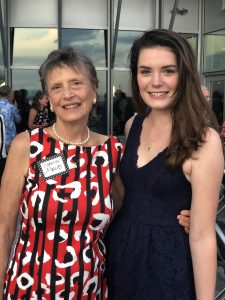 This summer, the Carolyn Crowley Meub Women Empowerment Scholarship was created in honor of PWW’s recently retired Executive Director of 17 years. This scholarship will be awarded annually to a student looking to make a difference in the lives of girls and women in developing countries.
This summer, the Carolyn Crowley Meub Women Empowerment Scholarship was created in honor of PWW’s recently retired Executive Director of 17 years. This scholarship will be awarded annually to a student looking to make a difference in the lives of girls and women in developing countries.
At PWW’s 20th birthday celebration, earlier this month, the first recipient of the scholarship was announced…Olivia Laramie. Olivia, a graduate student, has spent the past four years interning for PWW. She traveled to Honduras this summer to work on a project that helped measure the impact PWW’s menstrual hygiene program is creating in communities.
The following blog was written by Olivia following her time in Honduras:
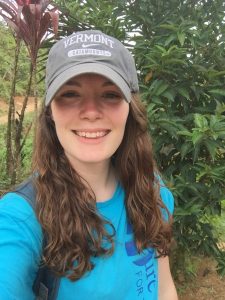 I began interning with Pure Water for the World during the winter of my junior year of college. At the time, I was majoring in Journalism and Anthropology and had planned on becoming a journalist post-graduation. PWW has an office about twenty minutes from my hometown in Vermont, and the location allowed me to live rent free with my parents while gaining valuable work experience.
I began interning with Pure Water for the World during the winter of my junior year of college. At the time, I was majoring in Journalism and Anthropology and had planned on becoming a journalist post-graduation. PWW has an office about twenty minutes from my hometown in Vermont, and the location allowed me to live rent free with my parents while gaining valuable work experience.
Fast-forward over two years later, I am now working towards my Master’s Degree in Public Policy and Administration with a focus on migration policy and nonprofits.
My Master’s program has an internship requirement and with the summer quickly approaching, I began searching for an internship that wouldn’t completely clean out my bank account. I reached out to the now past director of Pure Water for the World, Carolyn Meub, with questions about a potential internship with the office. Upon further discussions with both Carolyn and the Deputy Director, Jamin Gelder, about my goals and past experience with PWW, we decided that a trip to their offices in Honduras would best suit my goals and their own.
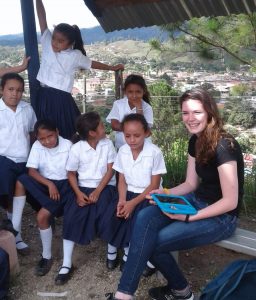 So here I sit, months later, having returned from Honduras about two weeks ago and feeling both incredibly grateful and spatially confused.
So here I sit, months later, having returned from Honduras about two weeks ago and feeling both incredibly grateful and spatially confused.
I spent the month of June in Trojes, a small mountain town in Southern Honduras, conducting research on PWW’s Menstrual Hygiene Management program. I also aided in latrine building, stumbled through my limited Spanish knowledge, handed out school uniforms, and performed other various tasks in the surrounding mountain communities and schools.
I returned home with an expanded understanding of my own privilege in regards to just how easy it is to be a menstruating woman in the United States. While there are many difficulties with menstruating in the U.S., many of us do not have the added stress of unclean water, toilets that don’t flush, and a lack of access to sanitary pads.
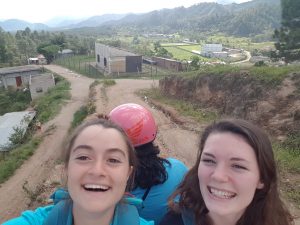 Additionally, I became even more aware of my footprint on the environment. While living for a month in a country where plastic water bottles and burning garbage are unfortunate necessities, it reminded me of the little things I am capable of doing here in the United States to help the environment. Plastic water bottles are unnecessary when, in most parts of the U.S., our tap water is perfectly clean. And we have the ability to separate our trash and recycle, so why shouldn’t we?
Additionally, I became even more aware of my footprint on the environment. While living for a month in a country where plastic water bottles and burning garbage are unfortunate necessities, it reminded me of the little things I am capable of doing here in the United States to help the environment. Plastic water bottles are unnecessary when, in most parts of the U.S., our tap water is perfectly clean. And we have the ability to separate our trash and recycle, so why shouldn’t we?
My time in Honduras was beneficial to both my career and worldview. It was eye-opening, exhausting, stressful, sad, joyous, and exhilarating all at once. Nearly everyone I encountered was welcoming and kind, especially the animals. The children were adorable and curious and the adults loved to talk about politics with me. I am so thankful for the kindness of the hotel workers who provided me with 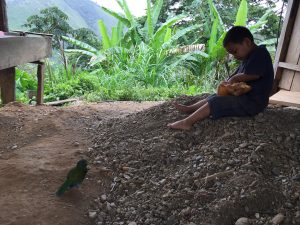 meaningful conversation everyday when I walked through the lobby on my way to work and shared the kitchen with them at dinnertime. I am thankful for Annette, the other PWW volunteer, who helped me as a pseudo-translator whenever my Spanish knowledge was not up to par and provided the friendship that becomes so necessary when you’re that far from home. I am thankful for the friends I made in various parts of the country and, of course, I am thankful for my co-workers both in Tegucigalpa and Trojes who provided me with so much help and entertainment.
meaningful conversation everyday when I walked through the lobby on my way to work and shared the kitchen with them at dinnertime. I am thankful for Annette, the other PWW volunteer, who helped me as a pseudo-translator whenever my Spanish knowledge was not up to par and provided the friendship that becomes so necessary when you’re that far from home. I am thankful for the friends I made in various parts of the country and, of course, I am thankful for my co-workers both in Tegucigalpa and Trojes who provided me with so much help and entertainment.
Lastly and most importantly, thank you to Pure Water for the World for providing me with the opportunity to travel and learn more about an area of the world that is often cast in a negative spotlight by the United States media and government. Remember that we do not get to choose where we are born no more so than we get to choose the color of our skin or the language we speak and calling a certain country home does not inherently make someone a “good” or “bad” person. People are simply people. Every person on this earth is capable of kindness and acceptance and the people I met in Honduras provided me with just that.
